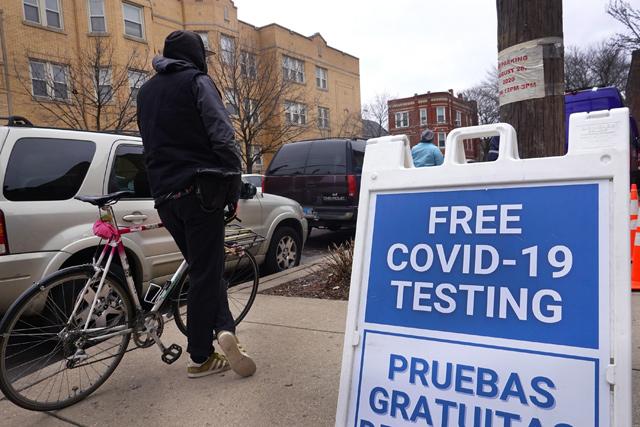- International News
- Web-2020-12-02 | 12:38 pm

Nayrouz News Agency :
Hopes for a first wave of vaccinations before the end of 2020 received a boost with US firm Moderna saying it was filing on Monday for emergency authorisation of its COVID-19 vaccine in the United States and Europe.
After top US scientists warned Americans to brace for a "surge upon a surge", Moderna reported full results had confirmed a high vaccine efficacy estimated at 94.1 per cent.
It was set to join American pharmaceuticals maker Pfizer and Germany's BioNTech, which applied for similar approvals last week, and have predicted their vaccine could be greenlit in the US shortly after December 10.
If the US Food and Drug Administration(FDA) agrees Moderna's product is safe and effective, the first of the drug's two doses could be injected into the arms of millions of Americans by the middle of December.
"We believe that our vaccine will provide a new and powerful tool that may change the course of this pandemic and help prevent severe disease, hospitalisations and death," said Moderna CEO Stephane Bancel.
Co-developed with the US National Institutes of Health, Moderna's vaccine is being studied in a clinical trial with more than 30,000 participants across the United States.
It was generally well tolerated, with the most common side effects including injection site pain, fatigue, muscle pain, joint pain and headache.
The firm said it expects to have approximately 20 million doses of the vaccine, called mRNA-1273, available in the US by the end of the year.
In 2021, it hopes to manufacture 500 million to one billion doses globally.
The news came after leading US scientist Anthony Fauci voiced his fears as millions of travelers returned home after the Thanksgiving holiday.
The United States is the worst-affected country, with 266,887 COVID-19 deaths, and President Donald Trump’s administration has issued conflicting messages on mask-wearing, travel and the danger posed by the virus.
"We may see a surge upon a surge” in two or three weeks, Fauci told CNN. "We don’t want to frighten people, but that’s the reality.”
The trend looks ominous, Fauci and other government scientists noted, with more travel and family gatherings to come at Christmas.
Fourth wave
At least 1,460,018 fatalities have been recorded worldwide since the outbreak emerged in China last December, according to a tally from official sources compiled by AFP at 11:00 GMT on Monday.
Europe is still battling to bring down the daily toll of death and infection with a variety of curbs, lockdowns and tests after fatalities topped 400,000 at the weekend.
Wales is resorting to banning hospitality venues from serving alcohol and making them close early from Friday.
In Asia, Hong Kong on Monday reimposed social distancing measures at some of their strictest levels in the city since the start of the coronavirus pandemic, as authorities battle a fourth wave of infections.
"This new wave of COVID-19 has hit Hong Kong very quickly,” chief executive Carrie Lam said, adding the new restrictions would take effect from Wednesday.
Anger over rising infection numbers sparked a riot in a Sri Lankan prison where guards shot dead eight inmates and wounded at least 71 others.
The country’s jails have seen weeks of unrest as the number of COVID-19 cases soared and authorities banned visits.
However, Australia’s success against the pandemic saw international students arrive Down Under for the first time since it shut the borders in March, with a charter flight touching down in Darwin on Monday.
Universities have been leaking cash due to the indefinite border closure, which has locked out foreign students who keep the billion-dollar sector afloat.
And New York City again took a small step back toward normality, as Mayor Bill de Blasio announced that elementary schools would reopen for in-person instruction on December 7.
The US news media reported that first shipments of the Pfizer vaccine against COVID-19 — one of the first to claim high effectiveness, along with Moderna — had arrived in the United States from a Pfizer lab in Belgium.
Pfizer was using charter flights to pre-position vaccine for quick distribution once it receives US emergency authorisation — expected as early as December 10 — The Wall Street Journal reported.
"This is the way we get out of the pandemic. The light is at the end of the tunnel,” Admiral Brett Giroir, the US official overseeing coronavirus testing, told CNN.
‘Hang on a little longer’
Until large numbers of Americans have been vaccinated — half the eligible population might be by March according to Giroir — much will still depend on people taking precautions, he and Fauci said.
Giroir said it might take until the second or third quarter of next year for most Americans to be vaccinated, but substantial benefits would accrue much sooner.
By first vaccinating those at highest risk, he said, "we can absolutely get 80 per cent of the benefit of the vaccine by only immunising a few per cent of the population”.
US surgeon general Jerome Adams voiced cautious optimism, saying, "We are mere weeks away from starting to vaccinate the vulnerable, and we can significantly protect people who are at risk for this virus.
"So hang on just a little bit longer.”













